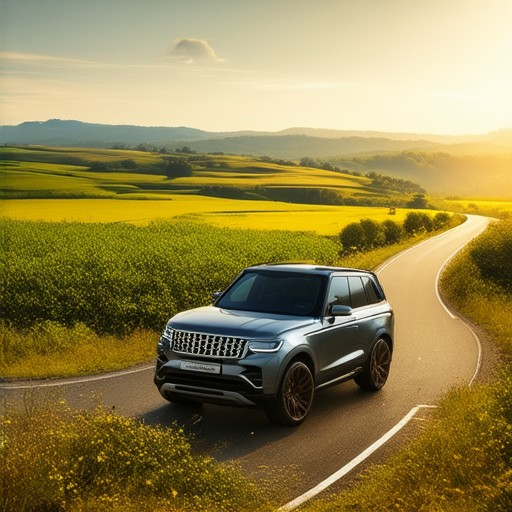When it comes to enhancing your SUV’s performance, style, and versatility, one of the most important components to consider is the type of rims you equip it with. Whether you’re looking to improve traction, reduce weight, or simply upgrade your vehicle’s aesthetic appeal, selecting the right rim type for your SUV can make a significant difference. From durability to performance, the choice of rims impacts nearly every aspect of your driving experience. In this comprehensive guide, we’ll explore the best rim types for SUVs, including popular sizes, styles, and finishes, helping you make an informed decision that aligns with your driving preferences and lifestyle.
Key Takeaways
– Understand the three primary wheel types: Steel wheels, alloy wheels, and forged wheels cater to different needs, from durability and affordability to premium performance.
– Steel wheels are ideal for everyday driving, offering durability, rust resistance, and versatility across various vehicles.
– Alloy wheels (often referred to as “alliance wheels”) provide a lightweight, performance-enhancing option with improved fuel efficiency and a sporty appearance.
– Forged wheels represent the pinnacle of strength and weight savings, making them a top choice for high-end and racing vehicles.
– Car rims come in various materials, including steel, aluminum alloy, chrome, and magnesium, each offering unique benefits like style, performance, and longevity.
– Choose between steel rims for reliability and cost-efficiency or alloy wheels for enhanced performance and aesthetics.

Which Type of Rim is Best?
Choosing the right type of rims for your vehicle involves considering several factors, including performance, aesthetics, budget, and durability. Here’s a breakdown of the most common types of rims and their advantages:
- Aluminum Alloy Rims
- Pros: Lightweight, enhances vehicle performance, corrosion-resistant, and offers a sleek aesthetic.
- Cons: Slightly more expensive and can be prone to scratching.
- Steel Rims
- Pros: Durable, affordable, and rust-resistant, offering a classic look.
- Cons: Heavier, less aerodynamic compared to aluminum.
- Forged Alloy Rims
- Pros: Extremely strong, lightweight, and offer a premium finish with better heat resistance.
- Cons: More expensive and require careful installation to prevent damage.
When deciding between these options, consider your budget, the performance demands of your vehicle, and your personal style preferences. For instance, if you prioritize strength and longevity, forged alloy rims might be the best choice. On the other hand, if you’re looking for a balance between price and durability, steel rims remain a popular option.
Additionally, exploring custom wheel designs through reputable brands like KMC Wheels or Forgestar Wheels can provide unique solutions tailored to your vehicle’s needs and lifestyle.
Remember, the best type of rim depends on your specific requirements and preferences. Whether you prioritize performance, style, or savings, there’s a rim type that aligns with your goals.
What Type of Rims Are Most Durable?
Steel rims are widely regarded as among the most durable types of wheels available. Their construction from high-quality steel makes them resistant to wear, tear, and impact, making them ideal for vehicles that face challenging driving conditions. Steel rims are known for their strength and ability to withstand rough roads, potholes, and heavy-duty applications.
When compared to other materials like aluminum or magnesium, steel rims offer greater durability and longevity. While aluminum rims are lightweight and popular, they can be more prone to scratching and denting under harsh conditions. Magnesium rims, though lightweight and strong, are more susceptible to corrosion and may require more maintenance over time.
For those seeking a balance between strength and versatility, steel rims remain a top choice. They are less likely to bend or crack compared to other materials, making them a reliable option for everyday driving or off-road use. Additionally, steel rims are often more affordable while still providing excellent performance and longevity.
If you’re looking for high-quality, durable rims, consider exploring options from trusted manufacturers. Incubus Wheels offers a variety of steel rims designed to meet the needs of different drivers, combining strength with style and reliability. Check out their collection to find the perfect fit for your vehicle.
- Alloy Wheels : A popular alternative to steel rims, known for their lightweight design and aesthetic appeal.
- Forged Wheels : Another durable option, crafted through a precision forging process for exceptional strength and heat resistance.

How to Identify Your Car Rims
To determine the type and specifications of your car’s rims, follow these steps:
- Examine the Inside of the Rim :
- Look closely at the inside surface near the spokes. Manufacturers often stamp important information here, such as the offset, width, and bolt pattern.
- Identify Offset and Width :
- The offset is typically marked as a number (e.g., +45 or -40), indicating how the wheel sits relative to the tire.
- The width is usually a numerical value (e.g., 8.5″) that reflects the distance from one side of the wheel to the other.
- Check the Diameter :
- Measure the diameter from one bead to the opposite bead. This helps determine the overall size of the wheel.
- Bolt Pattern Identification :
- Locate the bolt pattern, which is the spacing between the bolts where the wheel mounts to the hub. Common patterns include 5×100 and 6×135.
- Material Verification :
- Determine the material by examining the finish and weight. Common materials include aluminum, magnesium, and steel.
- Lip Style :
- Observe the size and shape of the wheel lip, which affects both aesthetics and functionality.
- Consult Manufacturer Resources :
- Check for stamped logos or model numbers that can help identify the exact wheel model and specifications.
- Use Online Resources :
- Compare your findings with online databases, forums, or manufacturer websites to cross-reference the specifications.
By systematically examining these features, you can accurately identify your car’s rims and their specific characteristics.

What Are the Three Types of Wheels?
The world of vehicles is diverse, and so are the types of wheels that power them. Whether you’re driving a family sedan, a high-performance sports car, or an off-road beast, understanding the differences between the three primary types of wheels can help you make an informed decision.
Here’s a breakdown of the three most common types of wheels:
- Steel Wheels : These are the most common type of wheels found on passenger vehicles. Made from high-strength steel, they are known for their durability, affordability, and versatility. Steel wheels are ideal for everyday driving and can handle rough roads with ease. They are also rust-resistant and long-lasting, making them a popular choice for many drivers.
- Alliance Wheels : Lightweight and designed for performance, alloy wheels are a favorite among car enthusiasts. Made from aluminum alloys, they offer a perfect balance between strength and weight reduction. Alloy wheels enhance fuel efficiency and provide a sportier look, making them a great choice for those who want to upgrade their ride.
- Forged Wheels : Forged wheels take the process of making wheels a step further. Created through a specialized forging process, these wheels are lighter, stronger, and more durable than both steel and alloy wheels. They are often used in high-end cars, racing vehicles, and luxury models due to their premium construction.
Each type of wheel has its unique advantages, and the best choice ultimately depends on your driving style, budget, and vehicle requirements. Whether you prefer the reliability of steel, the performance of alloy, or the premium feel of forged wheels, there’s a perfect match for every driver.
Explore more about these wheel types and find the best fit for your vehicle by visiting our Incubus Wheels collection. We offer a wide range of options to suit every need and preference, ensuring you get the most out of your ride.
Types of Car Rims
Car rims, also known as alloy wheels, come in various materials and designs, catering to different preferences and needs. Here’s a breakdown of the most common types:
- Steel Rims : These are the traditional choice for many vehicles. Steel rims are durable, cost-effective, and resistant to corrosion. They are commonly found on trucks, SUVs, and economy cars.
- Aluminum Alloy Rims : Lightweight and strong, aluminum alloy rims are popular for their aesthetic appeal and improved performance. They reduce the overall weight of the vehicle, enhancing fuel efficiency and handling. These are widely used on sports cars, luxury vehicles, and modern passenger cars.
- Chrome Rims : Chromed steel or aluminum alloy rims offer a sleek, polished finish. They are often chosen for their stylish look and are available in a variety of sizes and offsets. Chrome rims can give your car a premium appearance and are suitable for both daily drivers and high-end vehicles.
- Magnesium Rims : While less common, magnesium rims are lightweight and strong, offering excellent strength-to-weight ratios. They are typically found on specialized or racing vehicles due to their premium cost and unique appearance.
Each type of rim offers distinct advantages, from durability and cost-effectiveness to style and performance. Whether you’re looking for something subtle or eye-catching, there’s a rim option to suit your vehicle and driving style.
For more information on selecting the right rims for your car, visit our Incubus Wheels website. We offer a wide selection of rims and wheels to enhance your vehicle’s aesthetics and performance.

Which is Better, Rims or Mags?
When deciding between rims and alloy wheels (mags), it’s essential to weigh several factors including weight, maintenance, cost, and performance.
Weight and Performance
Alliance wheels are generally lighter than steel rims, which can improve fuel efficiency and handling performance. This lightness also contributes to better braking and acceleration due to reduced rotational inertia.
Maintenance
Steel rims are more durable in harsh conditions and less prone to rusting, making them easier to maintain. However, alloy wheels may scratch more easily and require regular cleaning to maintain their finish.
Cost
Alliance wheels are typically more expensive upfront but may offer better long-term value as they tend to last longer without rusting. Steel rims are cheaper initially but may need frequent replacement if damaged.
Aesthetic Preferences
Alliance wheels come in a variety of styles and finishes, offering greater personalization options compared to standard steel rims.
Real-World Considerations
Many drivers who prioritize performance and style opt for alliance wheels, while those seeking reliability and lower maintenance prefer steel rims.
Conclusion
Ultimately, the choice depends on your priorities: performance and style with alliance wheels, or durability and lower maintenance with steel rims.




0 Comments